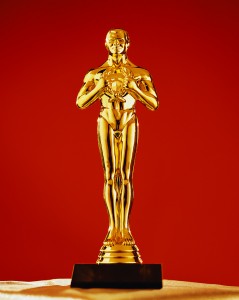The Oscars: Or, How I Learned to Stop Worrying and Mystify Film Culture
 It’s that time again: the time where Hollywood stands up and delivers its official pronouncement of what constitutes the finest in cinematic achievement for the calendar year. It is a time that makes film critics grunt and wail, while secretly handicapping each and every winner. It is a spectacle of exponentially decreasing cultural relevance. It is a moment when haggard stars attempt to squeeze out every last remaining sliver of goodwill to an indifferent public, hoping that some level of prestige may be bestowed upon them. Yes, the Academy Awards have arrived.
It’s that time again: the time where Hollywood stands up and delivers its official pronouncement of what constitutes the finest in cinematic achievement for the calendar year. It is a time that makes film critics grunt and wail, while secretly handicapping each and every winner. It is a spectacle of exponentially decreasing cultural relevance. It is a moment when haggard stars attempt to squeeze out every last remaining sliver of goodwill to an indifferent public, hoping that some level of prestige may be bestowed upon them. Yes, the Academy Awards have arrived.
A short bit of history: The Academy of Motion Picture Arts and Sciences was begun in 1927 as a clearinghouse for technicians, studio personnel, and members of the service industry to meet, share ideas, and decide the general direction in which the movie industry would head, especially with regard to standards of technology. The awards were almost an afterthought: the first ceremony took place in 1929 as an informal private brunch, the winners announced weeks beforehand. It didn’t take long for the Oscars—as they came to be known—to become the cultural force they (technically) are today.
What does winning an Oscar mean? Most people are basically aware of the fact that the films nominated every year don’t represent the best of what cinema has to offer. They earn mainstream critical acclaim, but as time passes, they are usually relegated to the status of a trivia question. Most academic and highbrow critical modes of taste reject the films as middlebrow claptrap, intended to be marketed as “art” to the masses. Indeed, David O. Selznick—the Harvey Weinstein of his day—only had aspirations to sell big, glossy, “serious” pictures to the American public as a way to escape from the more quotidian double features that regularly filled the neighborhood movie house.
Indeed, it’s not guaranteed for an Oscar-nominated film to be exorbitantly profitable. Granted, major Best Picture winners like Gone With the Wind, Lawrence of Arabia and The Sound of Music were major cash cows for their respective makers. In the modern age, an Oscar is a marketing tool to sell more DVDs, and it usually works. The long-term ramifications of this, however, are more suspect. Not too many people take Shakespeare in Love all that seriously these days.Even the awards ceremony itself seems to be less important. The Academy and its broadcasting partner, ABC, struggle to maintain ratings, its nadir reached during the 2008 awards season. This year, though, Avatar could change that.
Has anything changed about the Oscars since the 1930s? Studio marketing and release patterns have certainly changed. For the last 30 years, “Oscar Season” has ruled studio calendars from mid-October to the end of December, in which “serious” films that deserve recognition from the Academy are released for maximum fresh exposure to Oscar voters. (Eligibility closes on Dec. 31st.) The awards season builds momentum for various contenders, forcing nominees to show up at the Golden Globes, the Critics Choice Awards, the Screen Actors Guild Awards, and the Independent Spirit Awards in order to keep their names seemingly important. (Read Mark Harris’s profile of the “momentum” phenomenon here.)
The Academy is reaching into its past this year by nominating 10 films for Best Picture, the first time that’s happened since 1943. But don’t expect many surprises: Kathryn Bigelow, Jeff Bridges, Sandra Bullock, Christoph Waltz, and Mo’Nique are pretty much sure things. “The Battle of the Exes”—a Best Picture contest between Bigelow’s The Hurt Locker and James Cameron’s Avatar—is a real question. At the end of the day, however, none of these contests will be too Up in the Air.



Thanks for getting the Oscar discussion started, Evan. I know I was thinking about your point about how quickly Oscar winners drift off into the realm of trivia as I folded up my ballot at the end of the telecast last night (don’t ask me how I fared in predicting the results–the Inglorious Basterds straight ticket seemed like a good idea at the time). So much was said about Hurt Locker finally managing to do the war in Iraq some kind of justice, but will it remain relevant or salient? Will an Oscar bring it a new audience? (Full disclosure: I still haven’t seen it.)
On revisiting your post today, I was struck by your closing paragraph and how your predictions/the hype pretty much played out in the results. What do you make of how accurate the picks were? Does it matter if there are no surprises?
I think that THE HURT LOCKER will indeed have a longer shelf life, primarily because it’s being taken seriously by people beyond AMPAS. In fact, before December, I would have never in my wildest dreams thought it would’ve dominated awards season the way it did.
Most pundits thought that it would be–and then was–a pretty predictable ceremony. You gotta follow the narratives and the press coverage. Those will predict ’em every time. The only big surprises (for me, at least) were the screenwriting awards.
spot on, Evan — whenever I’ve entered into bets with people, the winners are those who haven’t seen the films and thus must follow the coverage alone. Thinking about quality clouds the ability to predict